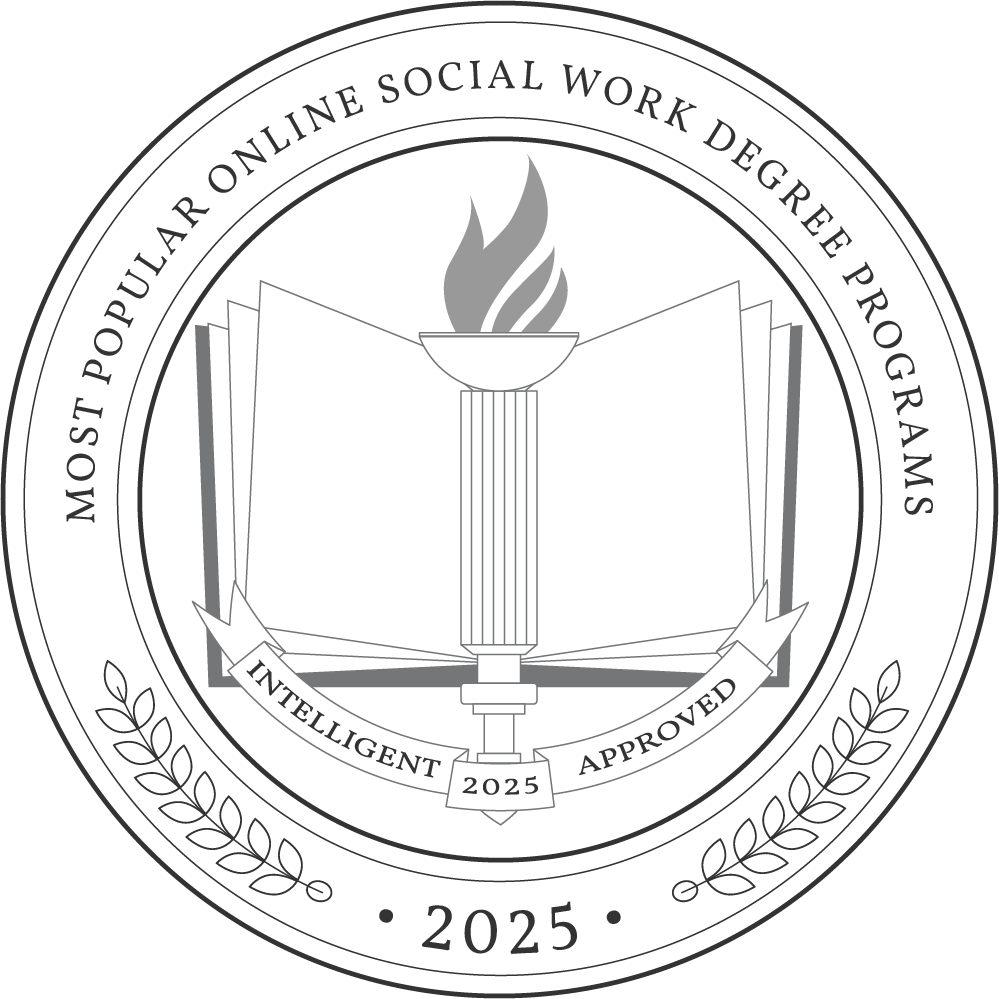For students seeking a flexible and accessible format to earn their degree, this article highlights the country’s most popular online social work programs. These programs are known for their positive reputations and high levels of student satisfaction, leading to increased graduation and job placement rates.
While a bachelor’s degree in social work provides essential foundational education, a master’s degree is required for licensure. This degree prepares students for various careers, such as mental health and substance abuse social workers, with a median salary of $55,960, and healthcare social workers, with a median salary of $62,940.
Undergraduate programs usually take four years to complete and cost an average of $14,688 in annual tuition, while graduate programs take two to three years with an average cost of $20,513.
Why Trust Us
The Intelligent.com Higher Education Team is dedicated to providing students with independent, equitable school and program rankings and well-researched resources. Our expert-driven articles cover topics related to online colleges and programs, paying for school, and career outlooks. We use data from the U.S. Department of Education’s College Scorecard, the National Center for Education Statistics, and other reputable educational and professional organizations. Our academic advisory team reviews content and verifies accuracy throughout the year for the most current information. Partnerships do not influence rankings or editorial decisions.
- Analyzed over 2,000 national, accredited, and nonprofit colleges and universities
- 800+ rankings pages are reviewed and updated yearly
- Content is informed by reputable sources, surveys, and interviews with academic advisors and other experts
- Over 100 data points are reviewed for accuracy and quality throughout the year, including sources
How we rank schools
Our list features the best Online Social Work degree programs at top colleges nationwide. Each school featured is a nonprofit, accredited institution — either public or private — with a high standard of academic quality for post-secondary institutions.
We evaluated each school’s program on tuition costs, admission, retention and graduation rates, faculty, reputation, and the student resources provided for online students. We collected data from trusted sources like the National Center for Education Statistics, individual school and program websites, school admissions counselors, and other data sources. Then, we calculated the Intelligent Score on a scale of 0 to 100 based on the following criterion:
Academic Quality:
- Admission rate versus enrollment rate
- Retention rate of students who return after year one
- Accreditation status (regional and programmatic)
- Nonprofit status, both private and public institutions
Graduation Rate
- Overall graduation rate
- Total number of currently enrolled students, including diversity metrics
- Student-to-faculty ratio
Cost and ROI
- In-state and out-of-state per-credit tuition rates and fees
- Required credits to graduate
- Earning potential after graduation
- Availability of federal student loans, scholarships, and other financial aid options
Student Resources
- Available student services for online-only and hybrid programs
- On-campus amenities like tutoring centers and the number of libraries
Read more about our ranking methodology.
Best 10 Accredited Popular Online Social Work Programs
FiltersInstitution Type
Status
- Intelligent Score
- Alphabetically By University Name
- Acceptance Rate
- Enrollment
- In-state Graduate Tuition
- Out-of-state Graduate Tuition
- In-state Undergraduate Tuition
- Out-of-state Undergraduate Tuition

University of Arkansas at Little Rock
Intelligent Score: 99.25In-state: $7,568
Out-of-state: $24,056
In-state: $7,752
Out-of-state: $7,752
SAT: 1090-1280
ACT: 23-29
$292
Online
Council on Social Work Education
120

Campbellsville University
Intelligent Score: 98.63In-state: $24,900
Out-of-state: $24,900
In-state: $8,473
Out-of-state: $8,473
SAT: N/A
ACT: N/A
$424
Online
Council on Social Work Education
120

Liberty University
Intelligent Score: 97.91In-state: $14,791
Out-of-state: $14,791
In-state: $7,935
Out-of-state: $7,935
SAT: 1040-1250
ACT: 21-29
$390
Online
Council on Social Work Education
120

Methodist University
Intelligent Score: 96.47In-state: $35,336
Out-of-state: $35,336
In-state: $37,240
Out-of-state: $37,240
SAT: 935-1135
ACT: 18-23
$435
Online
Council on Social Work Education
124

Southwestern Assemblies of God University
Intelligent Score: 95.64In-state: $20,496
Out-of-state: $20,496
In-state: $10,710
Out-of-state: $10,710
SAT: 900-1120
ACT: 16-22
$430
Online
Council on Social Work Education
120

University of North Dakota
Intelligent Score: 95.39In-state: $8,540
Out-of-state: $12,810
In-state: $11,060
Out-of-state: $11,060
SAT: 1000-1230
ACT: 20-27
$390
Online, On-Campus
Council on Social Work Education
120

Brescia University
Intelligent Score: 94.59In-state: $24,500
Out-of-state: $24,500
In-state: $600
Out-of-state: $600
SAT: 985-1085
ACT: 19-25
$450
Online
Council on Social Work Education
128

Aurora University
Intelligent Score: 94.40In-state: $25,600
Out-of-state: $25,600
In-state: $13,200
Out-of-state: $13,200
SAT: 980-1140
ACT: 19-23
$450
Online
Council on Social Work Education
120

Wayne State University
Intelligent Score: 90.78In-state: $13,024
Out-of-state: $29,894
In-state: $16,285
Out-of-state: $16,285
SAT: 1000-1200
ACT: 20-27
In-State: $519
Out-of-State: $1,189
Online
Council on Social Work Education
120

Bemidji State University
Intelligent Score: 90.38In-state: $7,976
Out-of-state: $7,976
In-state: $8,012
Out-of-state: $8,012
SAT: N/A
ACT: 19-24
$374
Hybrid
Council on Social Work Education
120
How to Choose an Online Social Work Program
Choose your area of study
You can tailor your social work degree to your career goals by choosing an area of study. Ask yourself:
- What populations am I most enthusiastic about serving?
- What social issues resonate with me the most?
- Do I prefer direct practice or policy/administrative work?
Specialization availability will vary by program, but some popular options include clinical social work, which is ideal for those wanting to provide therapy to individuals and families; school social work, which is suited for those interested in supporting students within educational settings; and healthcare social work, which is perfect for those who want to support patients in medical settings and navigate healthcare systems.
Research schools and programs
Once you’ve chosen a specialization, you can begin researching schools and programs in earnest. Consider the following questions to help guide your research:
- Is the program accredited by the Council on Social Work Education (CSWE)?
- What are the specific course offerings for my chosen specialization?
- Are there opportunities for fieldwork placements in my area?
- What is the program’s graduation and job placement rate?
- How does the school support online students?
This information can be found on school websites, by speaking with an admissions counselor, or by attending a virtual information session.
Prepare for tests and applications
With your shortlist of schools in hand, you’re ready to start preparing for tests and applications. This can be intimidating, but by simply starting early, you can make this significantly more manageable.
Request letters of recommendation and transcripts well in advance to avoid delays, and dedicate ample time to writing a personal statement or essay highlighting your strengths and enthusiasm for social work. If your school requires test scores, such as the SAT or ACT for undergraduates or the GRE for graduate students, consider enrolling in a test prep program to improve your performance.
Select your program
When acceptance letters arrive, you may have a big decision to make. Revisit your initial research criteria to select the best program. Focus on how each program meets your key priorities, such as school reputation, specialization courses, and fieldwork opportunities.
This is also the perfect time to reassess the total cost of attendance. Compare this with any financial aid offers to ensure your final decision is financially feasible.
Determine how you’ll pay for your degree
There are many financial aid resources to help you pay for your degree. Start with scholarships and grants, as these don’t require repayment. Next, consider work-study programs or assistantships, which provide income while you study. If you’re currently employed, ask your employer if they offer tuition reimbursement.
Even with all of these resources, financial gaps may remain. In these instances, federal loans may be helpful. Federal loans are generally preferable to private loans for their lower interest rates and flexible repayment options.
What Can You Expect From an Online Social Work Program?
An online social work degree program will provide you with the skills and knowledge necessary for a career in social services – regardless if you’re pursuing an associate, bachelor’s, master’s, or doctorate program. You can expect to learn about human behavior, social justice, community organization, and mental health at any degree level. The most innovative curriculums feature classes covering topics like policy analysis, research methods, and clinical practice.
Most undergraduate programs take four years to complete, while graduate programs take two to three years – usually including coursework and a traditional thesis. You may also need to complete fieldwork hours to gain hands-on experience in real-world settings. This practical training is essential for state licensure, ensuring graduates are ready to provide support to diverse populations.
Potential courses you’ll take in an online social work degree program
- Human Behavior and the Social Environment: Often one of the first courses you’ll take, this class explores the interplay between individuals and their environments, examining how social, cultural, and economic factors influence behavior. First-year students learn about developmental stages, family dynamics, and community systems to better understand client needs.
- Diversity and Oppression: Another fundamental course, this class focuses on issues of inequality and social justice, covering the impact of race, gender, class, and other identities on individuals and communities. Participants study strategies for advocating for marginalized groups and promoting inclusive practices.
- Social Welfare Policy and Services: This core requirement provides an overview of the social welfare system, including its history, development, and current policies. Students analyze the effectiveness of services and learn to advocate for policy changes to improve social welfare programs.
- Methods of Social Work Research: Typically an upper-level course, this class emphasizes the importance of evidence-based practice and equips students with skills to design and evaluate research projects. Learners study the fundamentals of conducting social work research, including qualitative and quantitative methods.
Online Social Work Degree Frequently Asked Questions
How do I apply to an online social work degree program?
Many social work degree programs feature a relatively straightforward application process, typically including:
- Official transcripts
- Letters of recommendation
- Personal statement or essay
- Current resume or CV
Undergraduate programs require a high school diploma or equivalent, while graduate programs typically require a bachelor’s degree in social work or a related field. Before submitting your application, it’s essential to speak to an admissions counselor to understand specific requirements and ensure your application is complete.
How much does an online social work degree cost?
According to the most recent National Center for Education Statistics data, the average undergraduate degree costs $14,688 in annual tuition, and a graduate degree averaged $20,513. As an online learner, you’ll also want to be prepared for additional expenses like technology fees, course materials, and textbooks, which aren’t included in the tuition and can add up over time.
To get an accurate estimate, it’s crucial to speak to a financial aid counselor at your school, who can provide you with detailed information on tuition, fees, and available financial aid options.
How long does it take to earn an online social work degree?
Earning this degree takes about four years for an undergraduate and two to three years for a graduate degree. Part-time enrollment will extend these timelines, often by a year or more.
It’s important to double-check the total number of required credits, as these can vary by program and influence the time it takes to graduate. Graduate programs, in particular, may have different credit requirements, affecting the overall timeline.

